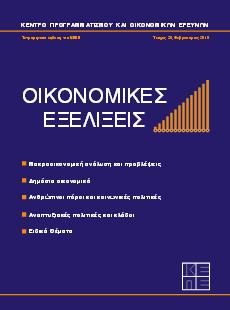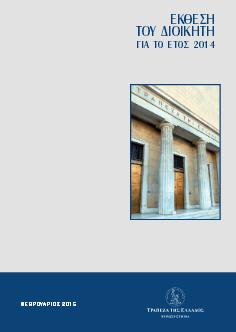Κέντρο Προγραμματισμού και Οικονομικών Ερευνών (ΚΕΠΕ) Οικονομικές Εξελίξεις, Τετραμηνιαία Έκδοση του ΚΕΠΕ, Τεύχος 26, Φεβρουάριος 2015. Το τεύχος 26 του περιοδικού του ΚΕΠΕ Οικονομικές Εξελίξεις βρίσκει τη χώρα σε νέα εποχή, με νέα κυβέρνηση και νέους μακροοικονομικούς προσανατολισμούς. Ως επιστημονικό περιοδικό, αλλά και ως ερευνητικό ίδρυμα με έμπειρο επιστημονικό δυναμικό και με θεσμικό ρόλο συμβουλευτικό της Κυβέρνησης, είμαστε εδώ για να παρέχουμε έγκυρη οικονομική ανάλυση, να αναδεικνύουμε τα …Read More
Sovereign default and debt restructuring: Was Argentina’s ‘haircut’ excessive?
Edwards, S. (2015) “Sovereign default and debt restructuring: Was Argentina’s ‘haircut’ excessive?“, VoxEU Organisation, 04 Μαρτίου. There were 24 sovereign defaults and debt restructurings between 1997 and 2013. Using data on 180 debt restructurings – for both sovereign bonds and sovereign syndicated bank loans – this column argues that the roughly 75% ‘haircut’ Argentina imposed on its creditors in 2005 was an outlier. Greece’s ‘haircut’ of roughly 64% in …Read More
Η μεταστροφή του ΣΥΡΙΖΑ – Η λιτότητα είναι εδώ για να μείνει;
Καλύβας, N. Σ. (2015) “Η μεταστροφή του ΣΥΡΙΖΑ – Η λιτότητα είναι εδώ για να μείνει;“, Foreign Affairs Hellenic Edition, 03 Μαρτίου. Περίληψη: Η Ελλάδα και οι Ευρωπαίοι εταίροι της αναμένεται να επιτύχουν μια μακροπρόθεσμη συμφωνία για την χρηματοδότηση της χώρας, μέχρι τον Ιούνιο. Ο ΣΤΑΘΗΣ Ν. ΚΑΛΥΒΑΣ είναι καθηγητής Πολιτικών Επιστημών στην έδρα Arnold Wolfers και διευθυντής στο Program on Order, Conflict, and Violence στο Πανεπιστήμιο Yale. Το …Read More
The end of fiscal waterboarding?
Gros, D. (2015) “The end of fiscal waterboarding?“, Economic Policy, CEPS Commentaries, 23 Φεβρουαρίου. In this Commentary, Daniel Gros argues that linking the primary surplus demanded of the new Greek government to the state of the economy is a sound approach. Some flexibility is warranted on this account, but the concept should be used to distribute the effort better over time, not to wriggle out of it. Σχετικές …Read More
Assessing Syriza’s first month in office: why Greece remains a long way from a break with austerity
Exadaktylos, T. (2015) “Assessing Syriza’s first month in office: why Greece remains a long way from a break with austerity“, LSE EUROPP, 03 Μαρτίου. The new Greek government, led by the Coalition of the Radical Left (Syriza), won power on 25 January. Theofanis Exadaktylos assesses the government’s first month in office. He notes that while Syriza won the election with a commitment to renegotiate the country’s bailout agreement, the …Read More
Έκθεση του Διοικητή για το Έτος 2014, προς την Ετήσια Τακτική Γενική Συνέλευση των Μετόχων στις 26 Φεβρουαρίου 2015
ΤτΕ: Έκθεση του Διοικητή για το Έτος 2014, προς την Ετήσια Τακτική Γενική Συνέλευση των Μετόχων στις 26 Φεβρουαρίου 2015, Τράπεζα της Ελλάδος – Ευρωσύστημα, Φεβρουάριος 2015. Έκθεση του Διοικητή κ. Γιάννη Στουρνάρα με Εντολή του Γενικού Συμβουλίου επί του Ισολογισμού της 31ης Δεκεμβρίου 2014 προς την Ετήσια Τακτική Γενική Συνέλευση των Μετόχων I ΑΠΟΛΟΓΙΣΜΟΣ ΧΡΗΣΕΩΣ 2014 1 ΑΠΟΤΕΛΕΣΜΑΤΑ ΧΡΗΣΕΩΣ 2014 Τα κέρδη της Τράπεζας στη χρήση 2014 …Read More
‘Foreign’ Money and ‘Austerity’ Haven’t Caused Greek Stagnation
Jerry, J. (2015) “‘Foreign’ Money and ‘Austerity’ Haven’t Caused Greek Stagnation“, Real Clear Markets News Site, 26 Φεβρουαρίου. The on-going “Greek Financial Crisis” is chock full of lessons about the nature of the entity that serves the functions of money in an economy. Historically, people have chosen to use as money everything from notched wooden sticks to metal coins to pieces of paper printed by governments. When alternatives have …Read More
Greece’s stance against crippling austerity is a fight to save all Europe
Weisbrot, M. (2015) “Greece’s stance against crippling austerity is a fight to save all Europe“, Tribune News Service, 26 Φεβρουαρίου. Greece has been dragged through a lot of mud in the media over the past few years because previous governments over-borrowed, and that contributed to the initial crisis that – we should remember – Spain, Portugal, Italy and almost everyone else in the Eurozone had to go through. But …Read More
Why Marxism fails in the Eurozone
Finkeldey, J. (2015) “Why Marxism fails in the Eurozone“, The European Magazine, 27 Φεβρουαρίου. Yanis Varoufakis dubbed himself an “erratic Marxist” and presented his interpretation of Marx in detail. But his dialectical spirit is unlikely to succeed. Karl Marx’s dream has come true: Europe is suffering in a long recession and some European capitals are under siege by indignant citizens. But are we really on the brink of disintegration …Read More
Note from Berlin: The Greek compromise
Dullien, S. (2015) “Note from Berlin: The Greek compromise“, European Council on Foreign Relations, 26 Φεβρουαρίου. When the eurozone finance ministers came up with a compromise with the new Greek government on the rescue package last week, the German media almost unanimously applauded Finance Minister Wolfgang Schäuble and Chancellor Angela Merkel. Although, later, there was some grumbling about the details of the list of reforms, the general tough stance …Read More






